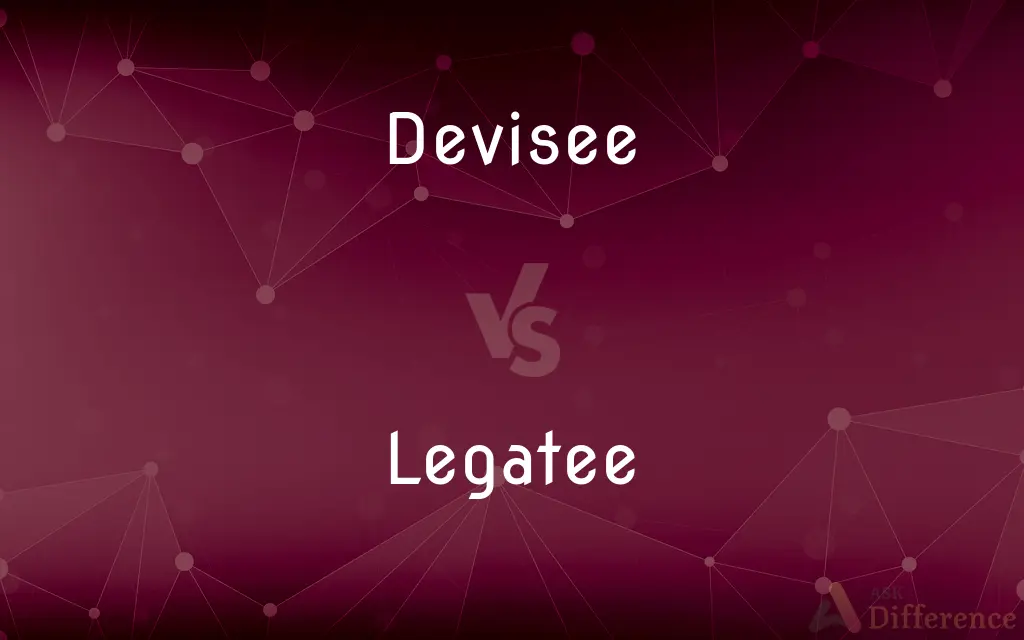Devisee vs. Legatee — What's the Difference?
By Tayyaba Rehman & Urooj Arif — Updated on April 2, 2024
A devisee is a person named in a will to inherit real property, while a legatee, also known as a beneficiary, inherits personal property or assets as specified in the will.

Difference Between Devisee and Legatee
Table of Contents
ADVERTISEMENT
Key Differences
A devisee is specifically involved in the context of real estate or immovable property inheritance. When a will outlines that a house, land, or any form of real property is to be passed on, the individual receiving this property is referred to as a devisee. This term underscores the nature of the property being transferred, highlighting its permanence and immovable characteristics. On the other hand, a legatee, often termed as a beneficiary in general contexts, inherits personal property, which can include money, stocks, or movable goods. This distinction is crucial in legal terms, especially when it comes to the execution of a will, as it delineates the type of property and the rights of the individuals involved.
The designation of someone as a devisee usually implies a deliberate and specific intention on the part of the will's author (testator) to pass on real property. It's a term that carries weight in legal proceedings, particularly in probate court, where the will's instructions are fulfilled. Conversely, a legatee might inherit assets that are more fluid in nature, such as cash, jewelry, or even intellectual property. While both devisees and legatees are beneficiaries under a will, the legal implications and processes can differ based on the nature of the property they receive.
Inheritance laws often treat real and personal property differently, with various procedures and tax implications for each. For instance, the transfer of real property to a devisee may involve specific regulatory compliance, such as property transfer taxes or registration, which doesn't apply to the distribution of personal assets to legatees. This legal distinction underscores the necessity of understanding the terms, as it affects how an estate is planned, the will is drafted, and ultimately, how the estate is administered.
Both devisees and legatees hold significant places in estate planning and will execution, reflecting the testator's wishes and the legal frameworks governing inheritance. While a devisee's inheritance is anchored in the tangible, fixed realm of real property, a legatee's can span a broader range of assets, embodying the more personal or liquid aspects of the testator's estate. Understanding these roles is key to comprehending the implications of inheritance, estate planning, and the legal processes that follow the death of the estate holder.
The relationship between a devisee and a legatee also reflects broader legal and cultural approaches to property and inheritance. In jurisdictions with detailed laws on estate division, the distinction helps in categorizing beneficiaries more accurately, ensuring that the testator's wishes are respected and legally upheld. It's a distinction that, while nuanced, plays a crucial role in the administration of estates and the distribution of a decedent's assets according to their final wishes.
ADVERTISEMENT
Comparison Chart
Definition
An individual named in a will to inherit real property.
A beneficiary named in a will to inherit personal property or assets.
Type of Property
Real estate or immovable property.
Personal property or movable assets, including cash and stocks.
Legal Process
Often involves property transfer taxes, registration.
Simpler legal process, may involve straightforward asset distribution.
Tax Implications
Can be subject to specific real estate inheritance taxes.
Subject to general inheritance taxes, depending on jurisdiction.
Representation
Reflects intention to pass on tangible, fixed assets.
Represents transfer of more fluid or personal assets.
Compare with Definitions
Devisee
An heir receiving real property through a will.
As a devisee, she inherited her grandmother's farmhouse.
Legatee
An individual designated to inherit money or personal items from a will.
Each legatee was allocated a portion of the estate's liquid assets.
Devisee
An individual designated to receive immovable property upon the will-maker's death.
The devisee took over the management of the family ranch.
Legatee
A beneficiary named in a will to receive personal assets.
The legatee received her cherished jewelry collection.
Devisee
A person named in a will to inherit land or buildings.
The will named him the devisee of the coastal estate.
Legatee
A person entitled to a specific legacy of personal property.
As a legatee, he was gifted the author's unpublished manuscripts.
Devisee
The beneficiary of real estate in a will.
The devisee was required to pay certain taxes before claiming the property.
Legatee
Someone bequeathed movable assets in a testament.
The charitable organization was named as a legatee in her will.
Devisee
Someone who is bequeathed real property in a testament.
As the sole devisee, he became responsible for the ancestral home.
Legatee
The recipient of personal property under a will.
The legatee's inheritance included valuable stocks and bonds.
Devisee
One to whom a devise is made; a beneficiary.
Legatee
A legatee, in the law of wills, is any individual or organization bequeathed any portion of a testator's estate.
Devisee
(legal) The person or entity to whom property is devised in a will.
Legatee
The inheritor of a legacy.
Devisee
One to whom a devise is made, or real estate given by will.
Legatee
(legal) One who receives a legacy.
Devisee
Someone to whom property (especially realty) is devised by will
Legatee
One to whom a legacy is bequeathed.
Legatee
Someone to whom a legacy is bequeathed
Common Curiosities
Why is the distinction between devisee and legatee important?
The distinction affects legal processes, tax implications, and the execution of the will, based on the type of property inherited.
Are tax implications different for devisees and legatees?
Yes, inheriting real property may involve different taxes and regulations compared to personal assets, affecting devisees and legatees differently.
Can someone be both a devisee and a legatee?
Yes, an individual can be named as both a devisee and a legatee in a will, inheriting both real and personal property.
Can the terms of a will regarding a devisee or legatee be contested?
Yes, wills can be contested on various grounds, such as undue influence or lack of capacity, potentially affecting devisees and legatees.
What distinguishes a devisee from a legatee?
A devisee inherits real property, while a legatee receives personal property or movable assets as specified in a will.
How do inheritance laws treat devisees and legatees?
Inheritance laws may have specific provisions for the transfer of real versus personal property, impacting the rights and obligations of devisees and legatees.
How does one become a devisee or legatee?
One becomes a devisee or legatee through being named in a will as an heir to real or personal property, respectively.
What is a devisee?
A devisee is someone named in a will to inherit real estate or immovable property.
How are disputes between devisees and legatees resolved?
Disputes are typically resolved through probate court, which interprets the will and applies relevant laws.
What happens if a will does not specify a devisee or legatee?
If a will is unclear, legal proceedings such as probate may determine how to distribute the property according to state or country laws.
Can a minor be a devisee or legatee?
Yes, minors can be named as devisees or legatees, though a guardian may manage the inheritance until they reach legal age.
How are devisees and legatees notified of their inheritance?
They are typically notified by the executor of the estate during the probate process, which formalizes the distribution of the testator’s assets.
What is the role of an executor in relation to devisees and legatees?
An executor administers the estate according to the will, ensuring that devisees and legatees receive their designated inheritances.
Can a devisee or legatee refuse their inheritance?
Yes, both devisees and legatees have the right to disclaim their inheritance, and the property may then pass to other beneficiaries or revert to the estate.
What happens if a devisee or legatee predeceases the testator?
The will's provisions or state laws determine the outcome, potentially involving alternate beneficiaries or reverting the property to the estate.
Share Your Discovery

Previous Comparison
Libra vs. Pound
Next Comparison
Compliment vs. CourtesyAuthor Spotlight
Written by
Tayyaba RehmanTayyaba Rehman is a distinguished writer, currently serving as a primary contributor to askdifference.com. As a researcher in semantics and etymology, Tayyaba's passion for the complexity of languages and their distinctions has found a perfect home on the platform. Tayyaba delves into the intricacies of language, distinguishing between commonly confused words and phrases, thereby providing clarity for readers worldwide.
Co-written by
Urooj ArifUrooj is a skilled content writer at Ask Difference, known for her exceptional ability to simplify complex topics into engaging and informative content. With a passion for research and a flair for clear, concise writing, she consistently delivers articles that resonate with our diverse audience.














































